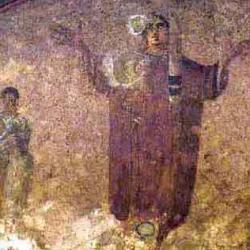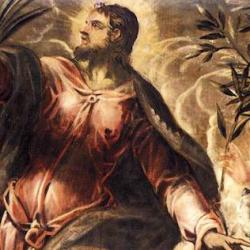Hebrews 10:29 warns about those who tread underfoot the Son of God and count the blood of the covenant “wherewith he was sanctified, an unholy thing.” This clearly presents a problem for Owen’s argument for definite atonement in The Death of Death in the Death of Christ . If Christ shed His blood only for the elect, how can someone who rejects Christ be said to be “sanctified” by that blood?
Owen responds with several arguments. First, he claims that the passage speaks “only of those that were professors of the faith of the gospel, separated from the world, brought into a church state and fellowship, professing themselves to be sanctified by the blood of Christ, receiving and owning Jesus Christ as the Son of God, and endued with the gifts of the Holy Spirit.” Such people only “profess” to be sanctified by blood, but in reality, Owen implies, they are not. This, however, weakens the force of Hebrews 10, and actually lessens the sin of the apostates: Trampling on blood that never really sanctified is not as wicked at trampling blood that bought you.
He goes on to argue that “it is most certain that these things are peculiar only to some, yea to a very few, in comparison of the universality of the sons of men; so that what is affirmed of such only can by no means be so extended as to be applied unto all. Now, if any one may be exempted, universal redemption falleth to the ground; from the condition of a very few, with such qualifications as the multitude have not, nothing can be concluded concerning all.” This doesn’t meet the problem. He’s right that the sanctification of a “few” doesn’t imply that Christ’s blood was shed for all; but by the same token, the fact that some are sanctified and not elect means that the blood of Christ’s atonement sanctifies some who are not finally saved. The “no exception” rule applies both directions.
Owen further argues that “The apostle doth neither declare what hath been nor assert what may be, but only adds a commination upon a supposition of a thing,” since his main aim is to deter the thing. What Hebrews describes cannot happen, and the text only gives a vivid description of what the results would be if it could. Again, this greatly weakens the force of the text, including the warning.
He’s on much firmer ground when he cites Hebrews 6:4-5, which speaks of those who who “had many gifts of illumination.” He adds, “besides their initiation by baptism, wherein open profession and demonstration was made of these things. So that a renunciation of all these, with open detestation of them, as was the manner of apostates, accursing the name of Christ, was a sin of so deep an abomination, attended with so many aggravations, as might well have anexed to it this remarkable commination.” But he undermines the point, and again weakens the force of Hebrews, by concluding with the qualification: “though the apostates never had themselves any true effectual interest in the blood of Jesus.” In one sense, this is clearly true; if they had “true effectual interest” in the blood of Jesus, they would have been saved eternally. Yet, in another sense, it’s false, because, as Hebrews says, they were “sanctified” by the blood of the covenant.
In the end, he concludes that “here is indeed no true, real, internal, effectual sanctification, proper to God’s elect, at all intimated, but only a common external setting apart (with repute and esteem of real holiness) from the ways of the world and customs of the old synagogue, to an enjoyment of the ordinance of Christ representing the blood of the covenant.”
It would seem much clearer and simpler to take Hebrews 10:29 at face value, and recognize that Jesus’ death has multiple effects: By His death and resurrection, Jesus inaugurates a new covenant that has absolutely universal effects – everyone is under the Lord Christ; like the blood of the Passover Lamb, it redeems a people, some of whom eventually trample on the blood that bought them; and, as Owen emphasizes, it is effective for eternal salvation for the sheep that the Father gives His Son.











